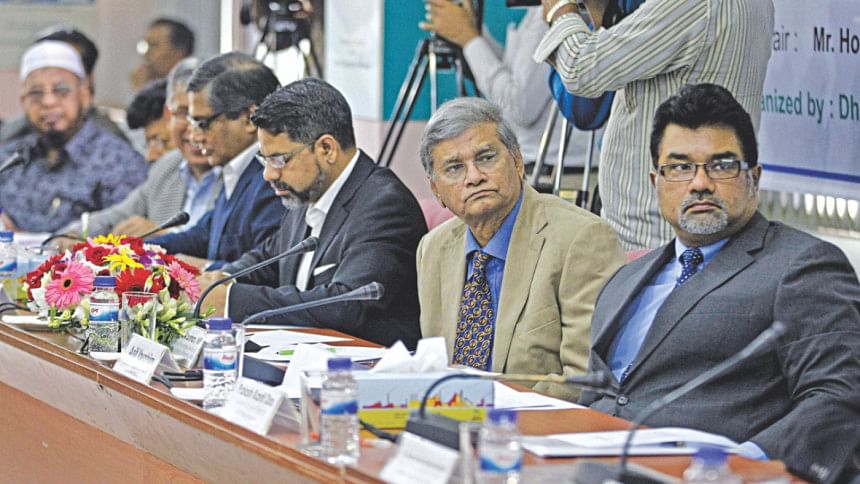Coordination with private sector key to reaching SDGs

Coordinated efforts with the private sector and an action plan with accountability hold the key to achieving the United Nations' 17-point sustainable development goals, analysts said yesterday.
The SDGs are focused on the private sector, while the millennium development goals were primarily focused on the social sector, said Ahsan H Mansur, executive director of the Policy Research Institute.
So, the government has to focus on the private sector, which, in turn, must actively participate to help achieve the goals.
Mansur's comments came while presenting a keynote paper at a seminar on the transition from millennium development goals to SDGs to industries and businesses, organised by the Dhaka Chamber of Commerce and Industry at its auditorium.
Seven of the 17 SDGs are directly linked with trade, business and investment.
So, without real and effective collaboration between the government and the private sector, the SDGs cannot be achieved, he said.
The country will have to face some challenges in attaining some of the goals set under SDGs, according to Mansur.
For example, ensuring access to affordable, reliable, sustainable and modern energy for all will be challenging for Bangladesh as the country is running out of gas.
Another major challenge will be building resilient infrastructure, promoting inclusive and sustainable industrialisation and fostering innovation.
“Without infrastructure no country can have a better economy. So, Bangladesh has to have better and sustainable infrastructure to attain the goal. Infrastructure will lead us to growth and the growth needs to be sustainable and inclusive.” Mansur said the energy outlook for Bangladesh and the reliance on coal for power generation in future will be a major challenge for the country. “Unplanned urbanisation will also be a challenge that we need to address now.”
The SDGs forecast 7 percent gross domestic product growth for least-developed countries, which, the economist said, is an opportunity for Bangladesh as the country is very close to attaining the target.
Combating climate change, sustainable consumption and production, development and uses of ports, and preventing air and water pollution are the other challenges for Bangladesh, he added.
“If we work collectively, the SDGs can be achieved,” said MA Mannan, state minister for finance and planning, adding that a link has to be created between the rural and urban communities to achieve the goals.
The government is fully committed to facilitating the private sector. Bangladeshi entrepreneurs are resilient and are moving the country forward, he said.
KAS Murshid, director general of Bangladesh Institute of Development Studies, said around 300 indicators are involved with the 17 SDGs.
The challenge for countries like Bangladesh would be how to contextualise the goals and the indicators, he said, adding that quality education, the rule of law and agricultural development are some other key priorities to look into. Commenting on the environmental issues, he said: “We are ruining our environment.”
“Bangladesh has limited lands and natural resources that we need to preserve for our next generation. We cannot destroy them,” Murshid added.
Asif Ibrahim, chairman of Business Initiative Leading Development, said investment of $5-7 trillion will be needed per year to achieve the SDGs globally.
So the funding will be a key challenge for Bangladesh as well, he said, adding that the country will need to increase its revenue collection, attract more foreign assistance and investment and utilise them properly.
He also stressed investment in infrastructure development under public-private partnership initiative.
Palash Kanti Das, assistant country director of the United Nations Development Programme, said the seventh five-year plan coincides with the SDGs in many ways.
But prioritisation and sequencing should be the first task, followed by drafting of a plan of action with accountability, to achieving the SDGs, he said. “If it is the private sector, then prioritise it first,” he said, adding that none of the SDGs can in fact be achieved without the private sector.
DCCI President Hossain Khaled recommended infrastructure development, power and energy security, skills development, technology adaptation, policy framework and long-term strategy for attaining the SDGs. He urged the government to ensure easy financing for small and medium enterprises, as it is the main driving force of the economy.
Khaled said the government should form a national implementation forum, a single and small platform consisting of public and private sector representatives along with all stakeholders, for monitoring the implementation process of the SDG initiatives.

 For all latest news, follow The Daily Star's Google News channel.
For all latest news, follow The Daily Star's Google News channel. 



Comments